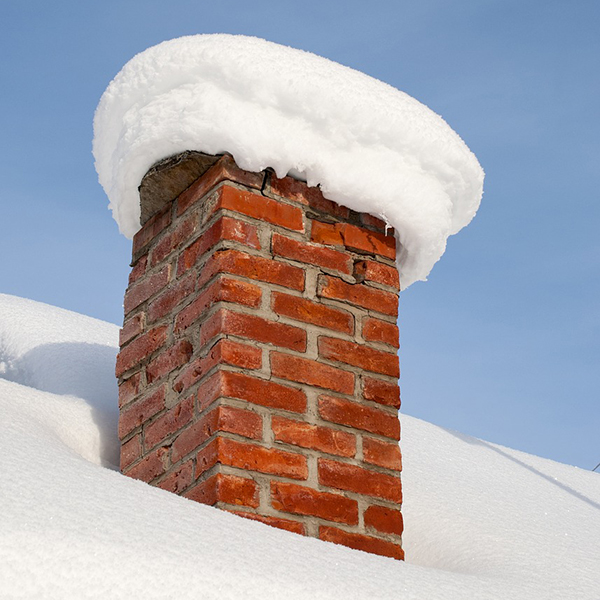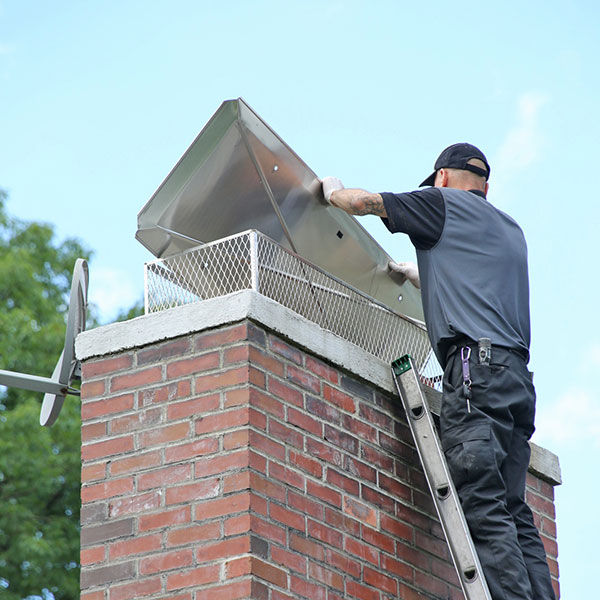Maintaining Your Chimney After The Winter Season
As the official start of winter approaches, the last thing on anyone’s mind is the chimney. Last minute holiday shopping, having winter tires put on the car, and shoveling snow are more common winter concerns. However, the chimney should be high on the priority list because winter can have cause serious damage to the structure.
 Masonry Chimney Thaw Cycle
Masonry Chimney Thaw Cycle
First, masonry chimneys have a special vulnerability to winter weather. The materials used to build masonry chimneys include brick, mortar, concrete and stone. Of all these materials, only stone is water resistant. All the others have a very porous texture, meaning they quickly absorb any water that comes into contact with them. Having water in the bricks or mortar does not cause much damage itself, but around winter time, the problems become more evident. When temperatures fall below freezing, all water begins a freeze and thaw cycle. This process involves the cyclic expansion of the water into ice and the consecutive contraction back into the liquid form. The water inside the masonry materials undergoes this process as well, so the materials experience a rhythmic swelling and shrinking motion too.
Constant motion like this degrades the strength of the materials over time, and it can result in cracked bricks, missing mortar and even a caving chimney. While cracks and missing mortar can be repaired with tuckpointing, the damage will continue until the inevitable collapse if the root of the problem is not addressed. To prevent this costly problem, a chimney specialist can apply a special permeable sealant to the exterior of the chimney.
Water Leaks
 Another common winter issue involves water leaking into the chimney. The warmth of a burning fire can melt any snow or ice on the chimney top, creating water that seeps easily into the chimney. The first problem this can cause is a rusted flue liner. If the liner is made of metal, the water can rust cracks and holes into it, and this renders the liner useless. The purpose of the liner is to protect the chimney and the home from the heat of the fire. It prevents the smoke and other fumes from entering the house and stops the adjacent woodwork from catching on fire. When water damages the flue, it no longer functions this way. Water can also leak down to rust the damper, which controls the flow of air and smoke through the chimney. Other evidence of water damage includes a degrading hearth and water stains on the walls and ceiling around the fireplace. A cheap alternative to repairing these damages is having a chimney specialist install a chimney cap.
Another common winter issue involves water leaking into the chimney. The warmth of a burning fire can melt any snow or ice on the chimney top, creating water that seeps easily into the chimney. The first problem this can cause is a rusted flue liner. If the liner is made of metal, the water can rust cracks and holes into it, and this renders the liner useless. The purpose of the liner is to protect the chimney and the home from the heat of the fire. It prevents the smoke and other fumes from entering the house and stops the adjacent woodwork from catching on fire. When water damages the flue, it no longer functions this way. Water can also leak down to rust the damper, which controls the flow of air and smoke through the chimney. Other evidence of water damage includes a degrading hearth and water stains on the walls and ceiling around the fireplace. A cheap alternative to repairing these damages is having a chimney specialist install a chimney cap.
If you live in the area of Norfolk, Suffolk, Barnstable or Plymouth Counties in Massachusetts, you can contact Above and Beyond Chimney Service to speak with an expert about protecting your chimney this winter.
